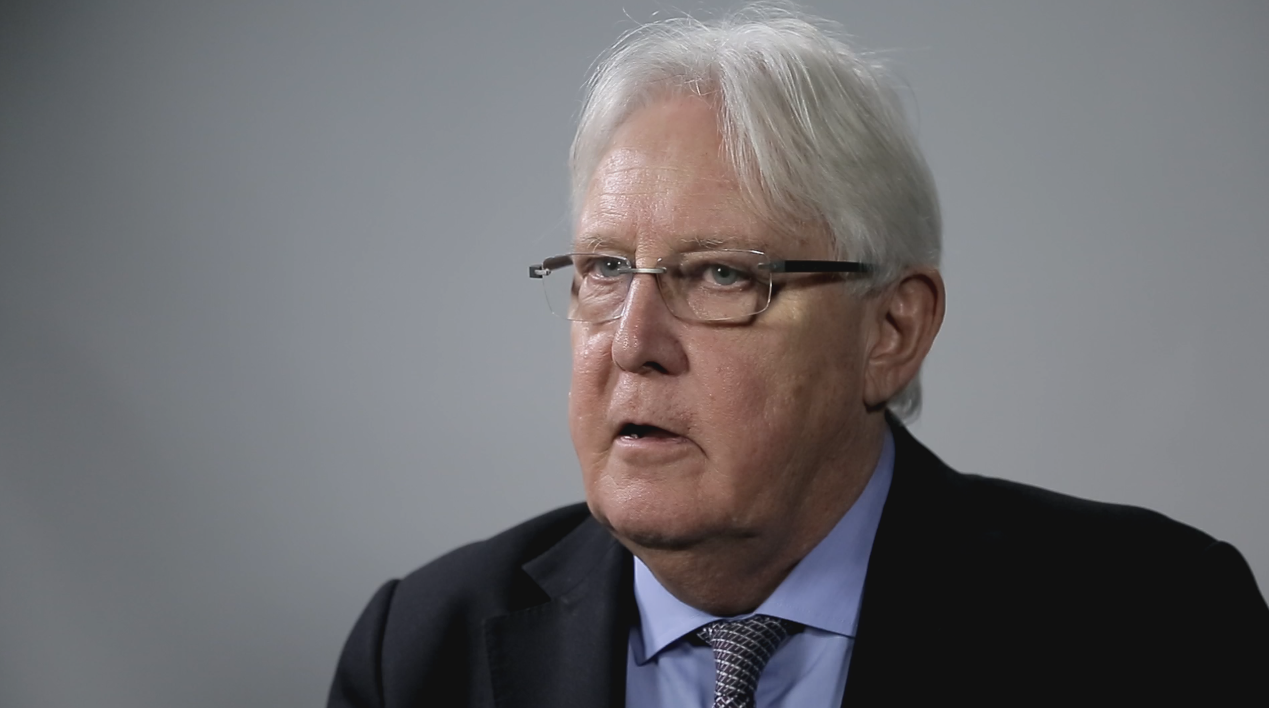In December 2018 the Government of Yemen and the Houthi movement agreed in Stockholm on the parameters for a ceasefire and redeployment of forces from the city of Hudaydah and the ports of Hudaydah, Saleef and Ras Isa. UN Special Envoy for Yemen, Martin Griffiths, in an interview with UN News, takes stock of the past year and discusses prospects for peace in Yemen.

One year after the Stockholm agreement on Hudaydah, what are your main takeaways?
We came out of the Stockholm agreement between the Government of Yemen and the Houthi/Ansar Allah movement with a great sense of hope, hope dashed in many ways, but also some considerable achievements. What it really taught me though, very, very strongly, was that there are certain issues which will not be resolved by agreements at the subnational level. We have to address the fundamental issues of sovereignty, of legitimacy through an agreement to end the war.
If there is ever an argument in favor of the need for speed towards a political solution to this war, it is those Yemeni families who suffer daily from the effects of conflict. But any political solution anywhere, in any conflict is immensely difficult. To move from war to peace requires those who lead in war to change the way they look at their constituencies, to change the way they look at the potential to end their hopes for military victory and to begin reaching out to their enemies and to make them part of the future. It’s a huge shift in any civil war. What I believe is happening now in Yemen is that, at last, we’re beginning to see that shift take place. We’re beginning to see, in the hearts and minds of those who make decisions, the desire to make peace and the recognition at a fundamental level that there is no prospect for military advantage, that there is nothing to be won on the battlefield and that there is a huge victory to be made in the terrain of negotiation.
How important is inclusion in the process of Yemen? Women, youth, the marginalized or the excluded, those who don’t have the right to make decisions about other people’s lives, all these people need to have a sense that whatever is agreed on their behalf, reflects their interest. And if we don’t do that, these agreements will not be sustainable agreements. There’s so much evidence around the world of that. So, this is not altruism, this is self-interest.
In Yemen, a few years ago, the national dialogue was driven in many respects by the participation of women. 30 per cent levels of representation of women in many of those fora was achieved. It was a powerful message to the rest of the world from Yemen that they could conduct a national dialogue in such an inclusive way. One of the things that we need to achieve in a peace process at the end of this conflict is to get back to those outcomes and to see how we can build on them. So yes, women, extraordinarily important!
In terms of my office, we have a women’s advisory group, which is part of the way in which we look at issues and which will come to all the talks, when we get back to them. We need, with the help and advice of women’s groups and the women’s movement, to try to make sure that in any peace agreement, it provides for adequate and hopefully powerful women’s and civil society roles in the transition that will then come. The power of transitions and the relevance of transitions after a civil war is that it allows those who have been marginalized by the war, who are not part of those who make decisions about how to conduct war, to get back to their place in the center of public life.
The Riyadh agreement between the Government of Yemen and the Southern Transitional Council was a recent sign of hope. How hopeful are you?
All agreements, in their written form, when they’re published and then negotiated, provide for very clear timelines, for A to happen, or B to happen, or C to happen. And in real life, things don’t go quite according to plan. So, I think it’s a bit early yet to say that the Riyadh agreement is or is not working. It’s certainly true, it’s not going according to those plans. But more importantly, I think, we can see that there is interest in both the government of Yemen and the Southern Transitional Council in making it work, perhaps not in all its aspects, but in enough to allow us, in our UN process, to mediate an end to the overall conflict. So, the Riyadh agreement gives us time – we hope. But if it falls apart, I think it will be a devastating blow to Yemen.
What is so fascinating about Yemen is the character of its people. Because you see in the character of its people a desire to be able to talk to each other, to be able to open up to each other. This sort of thing, that if we see this shift, this pivot towards a political solution, I am sure that the current social media and commentary, which is so polarized and so critical of ‘the other’, will shift rather quickly in Yemen to one which embraces ‘the other’. When we see that happen in social media, then I will be allowed to be optimistic.
Title picture: UNICEF/UN0209183/Bafaqeh
